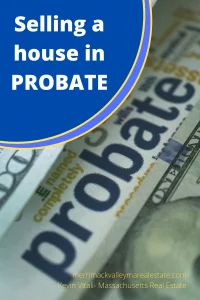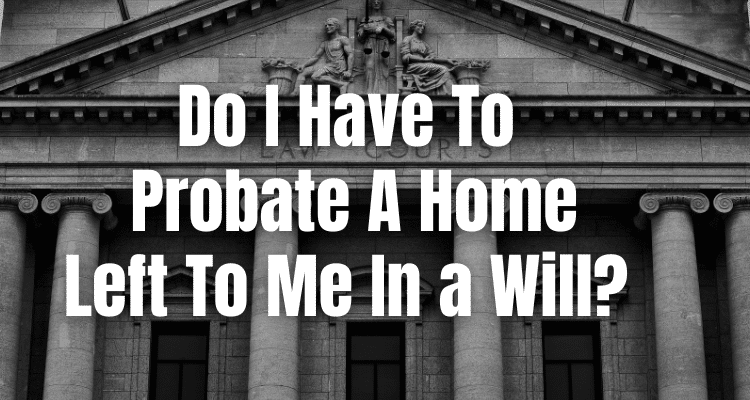 What happens to someone’s assets and property when they pass away can be a complicated legal process. It may include selling a house in probate to repay debts owed by the deceased person’s estate, or beneficiaries may agree to sell a property and distribute the proceeds under the supervision of a probate court.
What happens to someone’s assets and property when they pass away can be a complicated legal process. It may include selling a house in probate to repay debts owed by the deceased person’s estate, or beneficiaries may agree to sell a property and distribute the proceeds under the supervision of a probate court.
Before I go into more detail, please note that this article is for informational purposes. Working with an attorney experienced with estates, wills, and probate is essential.
Buying, selling, or otherwise transferring ownership of property under probate can be a lengthy and complex process that requires a specialized probate lawyer.
This article touches on some key points but should not be construed as legal advice. While selling a house that is part of an estate shares some commonality from state to state, laws vary from one to the other.
Let’s examine what selling a house in probate might entail.
But before delving into how to sell a house during probate you need to have a basic understanding of what an estate is, what probate is, and the role of an executor.
Jump To A Section....
What Is An Estate?
An estate is an individual’s assets. It can include homes, cash, vehicles, securities, jewelry, furniture, etc.… Anything of worth.
However, an estate’s net worth is also countered by an individual’s liabilities. Someone could have assets of a million dollars, but then they could have one point to two million dollars in debt. Essentially, in this case, the estate is worthless. The liabilities are more than the worth of the assets.
The word estate often comes into play upon someone’s death and is called a deceased estate.
If you have inherited a home, you may wonder what happens next. What happens to a deceased estate varies drastically depending on whether there was a will, whether the assets were held in trust, and the complexity of the entire situation.
What Is Probate?
Probate is the legal process through which a deceased person’s estate is administered and distributed. This also includes any houses, investment properties and vacation homes
This process involves validating the deceased’s will, if one exists, and ensuring that the deceased’s debts and taxes are paid before the remaining assets are distributed to the rightful heirs or beneficiaries.
During probate, a court oversees the handling of the deceased’s estate. This includes appointing an executor (if there is a will) or an administrator (if there isn’t a will) to manage the estate.
The executor or administrator is responsible for gathering the deceased’s assets, paying off any outstanding debts, and distributing the remaining assets according to the will or state law if there is no will.
Probate can be complex and time-consuming, often involving court appearances, paperwork, and sometimes beneficiary disputes.
Understanding probate is essential because it helps you navigate this process more smoothly. It ensures that the deceased’s wishes are honored and that the heirs receive their inheritance promptly.
The Role Of An Executor
The executor plays a pivotal role during the probate process, which is the legal procedure for validating a deceased person’s will and managing their estate according to their wishes.
Let’s break down the key responsibilities of an executor:
- Filing the Will: The first step is to file the deceased’s will with the probate court to initiate the probate process.
- Notification: The executor must notify the will’s beneficiaries and any potential heirs about the probate proceedings. Additionally, creditors must be informed, often through a public notice in a local newspaper.
- Inventory of Assets: The executor needs to identify and compile a comprehensive list of the deceased’s assets, which can include real estate, bank accounts, investments, and personal property.
- Valuation of Assets: Determining the value of these assets is essential. This might involve professional appraisals, particularly for real estate, jewelry, and other valuables.
- Managing the Estate: The executor manages the estate throughout the probate process. This includes paying ongoing bills, maintaining properties, and possibly liquidating assets to cover debts.
- Paying Debts and Taxes: The executor is responsible for settling the deceased’s debts and any outstanding taxes. This includes federal and state taxes, as well as the deceased’s final income taxes.
- Distributing Assets: After all debts and taxes are paid, the executor distributes the remaining assets to the beneficiaries as specified in the will. If there’s no will, state intestacy laws guide the distribution.
- Closing the Estate: Finally, the executor must file a detailed account of all financial transactions related to the estate with the probate court. Once approved, this allows the estate to be officially closed.
Acting as an executor requires organizational skills, attention to detail, and sometimes legal knowledge. It’s often beneficial for executors to seek professional advice to ensure they manage their duties efficiently and comply with legal requirements.

How To Sell A House In Probate
Selling a home in an estate may be necessary to free up cash to pay down debts or because the home’s beneficiaries want to sell.
Selling a house in probate is no different than selling any other asset in the deceased’s estate.
A value must be determined through an appraisal or broker price opinion and presented to the court for approval. The court needs to approve the final details of the sale after a home is listed and an offer comes in.
Selling a house or any estate asset is managed by the executor or administrator under the probate court’s supervision.
Basic Steps Of Selling A Home In Probate
As an overview, I will simplify the basics of selling a Massachusetts home in a deceased person’s estate. Bear in mind that often, an estate needs to be probated. It does not matter if beneficiaries and an executor are named in the will of the deceased.
- Start the probate process.
- Have the court appoint an administrator or executor.
- Get an appraisal on the home and submit to the court for approval.
- List the home.
- Secure a contract on the home.
- Submit the contract to the courts to obtain a license to sell.
Subject To Obtaining a License to Sell
A license to sell is a legal document from a probate court that allows an executor or administrator to sell estate property. This ensures the sale is legal and transparent, protecting the interests of heirs and creditors.
When listing a home in probate, there are two critical steps. The first is to notify the buying public that “the sale is subject to obtaining a license to sell.”
The second is to ensure any contacts to sell the home is also contingent on obtaining the license to sell. This language is critical to any contract to purchase and prevents the seller from defaulting on a sales contract.
Listing and Accepting An Offer On A House in Probate
When listing a home, it is essential to inform buyers that the home’s sale is subject to obtaining a license to sell before submitting a contract on the house. The Massachusetts MLS provides a disclosure section for the public to see and is a great place to notify the public that the home sale is contingent on obtaining a license to sell.
An offer or contract must state that the sale is subject to obtaining a license to sell. This prevents you from defaulting on the contract if you cannot close on time or secure the proper documentation on time.
How Long Does It Take To Sell A Home In Probate
The entire probate process can take as little as six months and up to two years or more, depending on the complexity of the estates.
After you have received approval to sell any estate properties and an accepted contract, it will take approximately 1-2 months to obtain the license to sell.
The million-dollar question is, when do I get the money? The answer is, it depends. Many factors contribute to the complexity of the estate, including the amount of assets and the difficulty in determining value, the number of debts, and specific bequests. Your attorney should be able to give you an estimated timeline.
Maintaining the Property While Selling A Home In Probate In Massachusetts
Whether a home or property in an estate is being sold or not, it still needs to be maintained. For many estates, a home can be the most significant asset, and maintaining its value is essential.
The maintenance and management of any homes in the estate includes many tasks.
- Gather All Outstanding Bills- All outstanding bills on the home must be paid.
- Notify Mortgage Holders and Vendors—You should immediately notify all vendors and mortgage holders of the owner’s death and make special arrangements if necessary.
- Continue Paying The Monthly Bills– Monthly obligations regarding the home still need to be met. And you certainly don’t want the house to fall into foreclosure.
- Maintaining the Home—The home still needs to be maintained, and if it is vacant, it should be checked periodically. Any repairs should be done promptly.
The executor should be responsible in overseeing the maintenance of any properties held in an estate.
Selling A Home In Massachusetts Probate- Considerations
There are a couple of things to consider when selling an estate home. The level of commitment of the people involved also matters.
Over the years, I have run into families that are emotionally drained by the loss of a loved one. And, due to the high level of emotions or the lack of energy, they feel they cannot make the necessary preparations to sell the home for fair market value.
This could mean removing all personal belongings from the home, cleaning the house, making minor repairs that will increase the value, and keeping the home in tip-top showing condition during the listing’s life.
Options for the Traditional Sales Route When Selling A Probate
If receiving top dollar is not the most essential consideration during the sales process, there are several options to sell your home.
The first two can liquidate the property in 2-4 weeks with little or no effort on your part, but realize you are leaving money on the table.
The third option will get you close to fair market value as the home sits, but selling the property could take 45 to 90 days or more. But again, you may be leaving money on the table versus a traditionally listed home.
- Sell To An iBuyer—An iBuyer allows you to submit information online and get a tentative offer on your home, subject to a physical walkthrough. iBuyers and can close quickly, but they realize they are looking to resell the home for a profit immediately. However, you skip selecting a REALTOR, preparing your home, and showing your home.
- Sell To A CashBuyer/Investor- The cash investor is looking for homes that need significant repairs or updating to complete and turn a profit. Again, the amount of effort and time you must put into it is limited.
- Sell the Home As-Is with A REALTOR—This strategy to sell as a liquidation sale as-is and where is will reap you the most, but it will take longer and require a little more work. However, there are strategies where a REALTOR can sell a home as-is and find an end-user buyer willing to do the extra work to create a home for themselves who will pay more than investors looking to make money on the back end.
Selling An Estate Property In Probate For Top Dollar
While there is a process for selling a Massachusetts home in probate, selling a home to obtain top dollar is the same as any other home sale. The difference is that the probate courts monitor and approve the sale.
Like any other home sale, it is essential to properly prepare the home for the current market, price accordingly, and apply sound showing principles. I will not delve into detail about selling your home for top dollar here as I have extensive articles covering this topic already. But here are some articles to review about selling a home in Massachusetts:
The Role Of An Experienced REALTOR In The Sale Of A Home In Probate
Do you need to use an agent to sell a home in probate? No.
But it will be in your best interest to work with a REALTOR having experience selling estate property. They must understand the process of probating a property to communicate with the seller and probate attorney.
Additionally, they should have resources to help prepare a home, including potentially trashing out a house, donating items that can be passed along, and professionals who may be needed to repair the home.

Do Homes In An Estate Have To Be Probated Even If There Is A Will?
A common question is why a home left to me in a will needs to be probated.
Even if there is a will, the simple answer to the question is maybe. The deciding factor is how the title was held for the home.
If the home was held as a sole owner or as tenants in common, even with a will, the sale or transfer of the property must go through the Massachusetts Probate Court. If the home was held jointly with the rights of survivorship, the house would not go through probate.
Avoiding Probating A Home
There are several strategies for keeping your home out of probate when passing your home on to a loved one after your death.
One of the more popular strategies is creating a Living Trust, where the trust becomes the beneficiary and all assets are transferred to the trust itself. All assets can be distributed from the trust and avoid the need to probate the estate.
Another possible strategy is creating a life estate. A life estate is a type of property ownership where someone (the “life tenant”) has the right to use and live in a property for their lifetime. After they pass away, ownership automatically transfers to another person, known as the “remainderman,” without needing probate.
In the case of a married couple holding a home in Tenants in the Entirety with rights of survivorship, the house is automatically transferred to the surviving spouse, avoiding probate.
Seek out an attorney specializing in wills, trusts and probate to layout your options that best suit your individual circumstances.
FAQs
What is probate, and why is it necessary?
How do I start the probate process in Massachusetts?
Do I need a license to sell the property?
Can the property be sold before probate is completed?
What are the steps to sell a house in probate?
Are there any specific disclosures required when selling a probate property?
Conclusion
Selling a house in probate involves a complex legal process that requires careful navigation. Understanding the roles of the estate, probate, and the executor is crucial. The probate court’s supervision ensures transparency and legality, protecting the interests of heirs and creditors. Executors must follow specific steps, from obtaining an appraisal and listing the home to securing a license to sell and maintain the property.
While probate can be lengthy and intricate, working with an experienced attorney and REALTOR can streamline the process and help achieve a fair market value for the property. Proper preparation, clear communication, and adherence to legal requirements are key to successfully selling a probate property.

Author Bio
Kevin Vitali is a Massachusetts REALTOR out of Haverhill MA that serves Essex County and Northern Middlesex County in Massachusetts. If you want to buy or sell a home, let me use my years of experience to get you the best possible outcome.
Feel free to contact me to discuss any upcoming moves. I am always happy to answer your questions
Call 978-360-0422 Email kevin@kevinvitali.com




